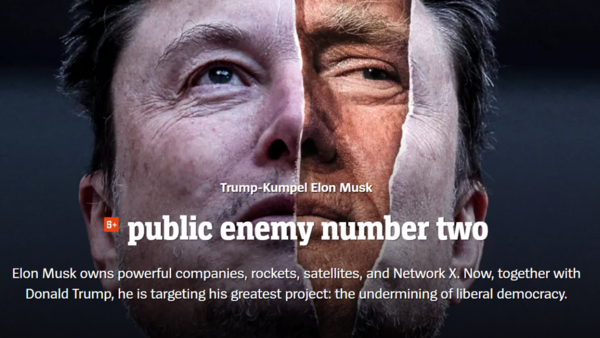Billionaire Elon Musk recently reposted a tweet reacting to the German Magazine Spiegel report ‘Public Enemy Number 2′ and equated him to Hitler. In the repost, Musk humorously wrote, “Well, I did Nazi that coming! Those fools will Goebbels anything down … I bet their pronouns are He/Himmler!”—a reference to notorious Nazi figures Joseph Goebbels and Heinrich Himmler.
In the repost, Naomi Seibt, a German YouTuber and political commentator is seen defending Musk, calling the article a ‘carefully worded instruction to the reader’ and arguing that the article paints him as a villain.
Musk himself had questioned during a rally, “Enemy to what?”—challenging the magazine’s portrayal of him as a threat to political elites.

Thumbnail on Der Spiegel magazine article
The YouTuber says that the article from Spiegel also touches on several controversial remarks Musk has made, including his criticism of US elections, which he suggested could be manipulated via ‘voting machine sabotage’ or ‘illegal immigrant participation.’ The report claims that Musk’s opposition to “woke culture” and his views on immigration contribute to a growing perception of him as a political antagonist.
According to Naomi, one of the more provocative accusations circulating in the wake of the article is the claim that Musk implied he would like to rape pop star Taylor Swift. The said tweet was after Swift declared her support to Presidential candidate Kamala Harrris. “Fine Taylor … you win … I will give you a child and guard your cats with my life,” Musk had written.
According to Seibt, One of the most controversial aspects of the Spiegel report is its implicit comparison of Musk’s influence to a “reich,” a term historically associated with Nazi Germany. Some interpret this as a provocative and unfair attempt to portray Musk as a villain, while others believe it reflects concerns over his expanding power and influence in global media and politics.
The Spiegel report ‘Staatsfeind Nummer zwei’ discusses Musk’s rise as a polarising figure, especially his growing influence in technology and media. It covers his criticism of US government policies and regulatory disputes and his outspoken behaviour on social media, particularly his platform X (formerly Twitter).
